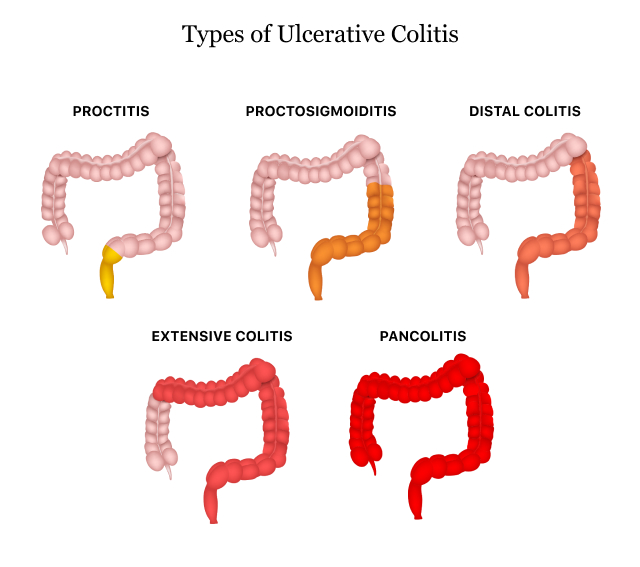Ulcerative Colitis is an inflammatory bowel disease which causes inflammation on your digestive tracts and can also cause ulcers (sores). This impacts the innermost lining of your large intestine (colon) as well as your rectum. The symptoms for Ulcerative Colitis tend to develop over a span of time instead of happening all of a sudden. Ulcerative Colitis can be life threatening and can also lead to severe consequences as a result. Therefore, it is extremely important to visit a doctor as soon as you experience any symptoms in order to avoid it from getting much worse over the course of time.
Here are some of the symptoms of Ulcerative Colitis:
- Diarrhea, often accompanied by blood
- Abdominal pain or cramping
- Rectal pain and bleeding – passing blood with your stool
- Appetite and weight loss
- Fatigue and fever
Some individuals experience mild symptoms while others may experience severe symptoms, this varies from person to person.
Types:
There are different types of Ulcerative Colitis that exist. The doctors have categorized them in accordance to their locations. These include:
- Ulcerative proctitis: over here, the pain is predominantly confined to the area near the rectum and one of its main signs or symptoms are rectal bleeding.
- Proctosigmoiditis: the inflammation is in rectum and the lower end of your colon. He predominant signs of this are diarrhea, abdominal pain, and unable to move bowels even if you want to or try to.
- Left-sided colitis: Inflammation goes from the rectum to the lower and descending end of the colon. Over here the signs include diarrhea, abdominal pain, and a need to defecate as soon as possible.
- Pancolitis: This type impacts the entire colon and causes extreme bloody diarrhea with loss of appetite, weight loss, cramps, pain and fatigue.
Risk factors
Some of the risk factors include:
- Age. Most individuals who are at risk of Ulcerative colitis are those who are below the age of 30. This is because statistically show that Ulcerative colitis occurs in individuals that are young. However, this does not set in stone the age limit as regardless of the predominant cases, there is still a chance of it occurring at any point in time.
- Race or ethnicity. Statistics show that whites are at the highest risk of getting the disease as compared to other race or ethnicities.
- Genetics. Family history is an extremely significant factor when it comes to diseases and it is not to be excluded in this particular disease as well. If you have. A close relative such as a parent or a sibling who has this disease then you are at a higher risk than a normal individual to get this disease.
Therefore, if you feel you are experiencing these symptoms and would like to go for a checkup then we have the best doctors available for you! You can find the best Laparoscopic Surgeon in Lahore and the best Laparoscopic Surgeon in Islamabad according to the city you live in.


